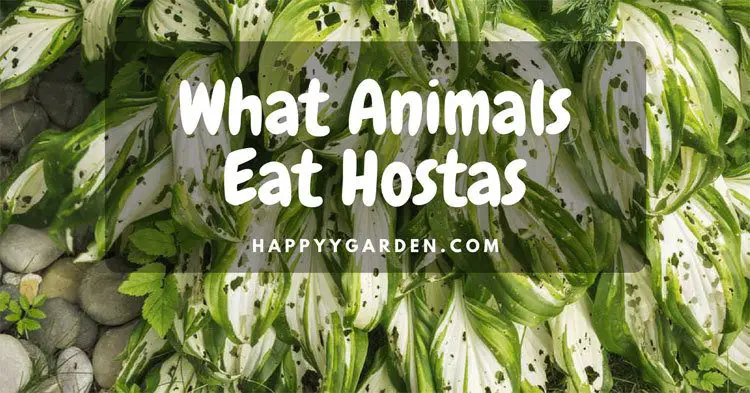What Animals Eat Hostas? Creatures That You Need to Be Aware Of
You did not see it coming, did you? I knew that you had added the latest of your perennial plants’ collection. But, where are those hostas now?
The green leaves, pretty flowers and the beautiful display of harmony are all gone. The leaves were eaten, even the stems are gnawed and the roots too. The sight is a complete disaster!
I can’t blame you when I saw the shock, frustration, and anger in your face. Even so, you are more puzzled than annoyed upon staring at those destroyed plants. What animals eat hostas?
You see, animals can be a darling. However, do you know that they can be a headache too? Do you have an idea who ate your hostas?
Plenty of creatures thrive by eating plants surrounding them. You need to be aware at least of those that are common in anyone’s garden. Knowing those animals is a way of protecting your plants.
Table of Contents
So, What Animals Eat Hostas?
Deer
Deer could be troublesome. Do you have plenty of them around? Hostas are their favorite. If they can’t attack your plants at daytime, for sure, it won’t take an hour before all your hostas are gone for their midnight grub.

The fragrant scent of the plants can easily lure these large animals in your vicinity. If you can find a way, apply heavy protection to those sweet-smelling ones. But, overly aromatic foliage can repel deer. If the scent is too strong for their nose, they tend to be confused.
You can protect your hostas by spraying some of that deer repellent. They are non-toxic to your plants but covers them with a bitter taste. The deer may avoid the hostas because of the nasty taste of the leaves, but take note that this spray is not waterproof.
The spraying method is only practical on dry weather; otherwise, you will find yourself spraying after each rain.
Have you thought about investing for a sturdy and secure fence instead? Since deer are large and can jump, I recommend installing high and metal fences to keep the scavengers out.
Rabbits
Rabbits and hostas do not go along together. So when you are a hosta collector, and your children suddenly want a pet rabbit, what will you do? I warn you, rabbits can really be a nuisance.

Rabbit-happyygarden.com
These furry babies prefer the newly sprouted leaves for their nibbling. Expect that happening in early spring and may go further and eat flowers later on. It’s hard to control rabbits especially when you are living in an area where they are free to roam and multiply.
Fences can be effective but never underestimate a rabbit. Since they are small, can jump, and smart, they may find ways on how to beat that naughty fence. Anyways, clearing your place from weeds may help.
Try mowing your area and get rid of the weeds that surround your hostas. These little destroyers can hide behind the bushes and high grasses. Give yourself visual access around to see what’s coming.
Oh dear, if none of these will work, will it warm your heart if I give you some rabbit stew, or a joke or two?
Squirrels, Voles, Rats, And Other Types Of Rodents
These creatures are more bothersome than the rabbit and deer, particularly on dry season. Squirrels turn to leaves and roots for water during dry weather. These animals are smaller, faster and use a technique that is hard to detect.

Vole-happyygarden.com
Unfortunately, they are not satisfied with eating the leaves of the hostas alone, but they also dig under and chew the roots. Therefore, discovering the damage would often be too late.
Now, no plant will survive after such an attack. Such nuisance does not only stop from restricting the growth of the hostas but kill them as well.

To protect this from happening, you can enclose your hostas with cages and fences. It would be an enormous job to do considering that you own a variety of hostas around. This is also true with burying steel meshes or inclusions around the plants to protect the roots.
Other options would be to spray spicy sauce or sprinkle pepper on the leaves (and at the area that surrounds it) to discourage the animals from eating them. Imagine the time and effort you will spend if you have a vast landscape.
The animals I have mentioned are big sufficient to spot. Unless they burrow underneath, they are large enough to see at daylight and noisy enough to detect at night
Snails And Slugs
These nocturnal pests are what I dread the most. They are tiny, slow, slimy and many all over. They stick around without causing any noise.

Snail-happyygarden.com
I call them the silent destroyers who leave traces of tiny holes, wet and shiny trails. You can prevent these pests from eating all your hostas by picking them manually. I am scared of little slimy things that crawl, stick, and wriggle so this is already a big NO for me, but might work for you.
Hence, I opt for beer traps. Merely put a little bit of beer in a small tin or any container and place a number of it around the area. It will attract snails and slugs because of its smell.
They will go in, sip some, get drunk, fall in, drown, and die.
Cutworms
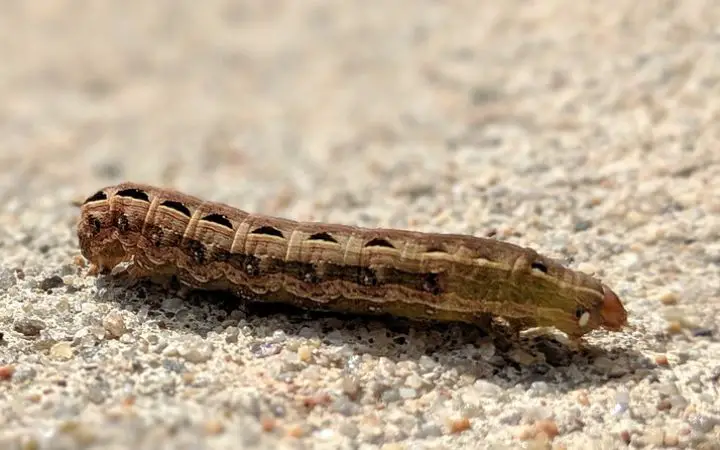
Cutworms are a common insect that can and will eat hosta. They get their name from the fact that they cut off parts of plants.
A Cutworm is an immature worm-like moth whose larva or caterpillar has the ability to move like a snake, hence referring to them as "cut" worms. The reason for this is because, to escape predators, cutworms will roll up into a tight ball.
However, if given the opportunity, cutworms will devour most plant material, including hostas. So if you find holes in your hosta leaves and stems along with excrement, look no further than these little pests to blame.
Cutworms come out at night between dusk and dawn, unlike most other creatures that come out during the day.
These moths can lay anywhere between 100-1000 eggs in their lifetime, hatch into larvae that feast upon hostas and various other plants.
A female moth will typically lay her eggs on or near the ground, where they will stay for about 1 week before they hatch, turning into larvae that consume plant material like leaves, stems, and roots of various garden plants, including your prized Hosta.
The larvae are completely harmless to humans but can be detrimental to your healthy plant life. So if you've ever seen holes in your Hosta foliage, don't forget to look above ground for these little pests because chances are it may be one of them responsible for damaging your plant life and creating new cavities on your hostas.
When the Cutworms are mature, they spin a cocoon and emerge as moths ready to mate and lay more eggs on your plants the following year.
To prevent hosta "munching" from these insects, you can carefully handpick them off your hosta leaves or apply soapy water with a watering can onto the ground near your hostas to keep them at bay.
However; it is much easier to apply natural insecticide, such as Neem oil, to protect your plant life that way, you don't have to worry about forgetting, missing a step, or spending countless hours picking bugs off of your favorite flowers.
Black Vine Weevils
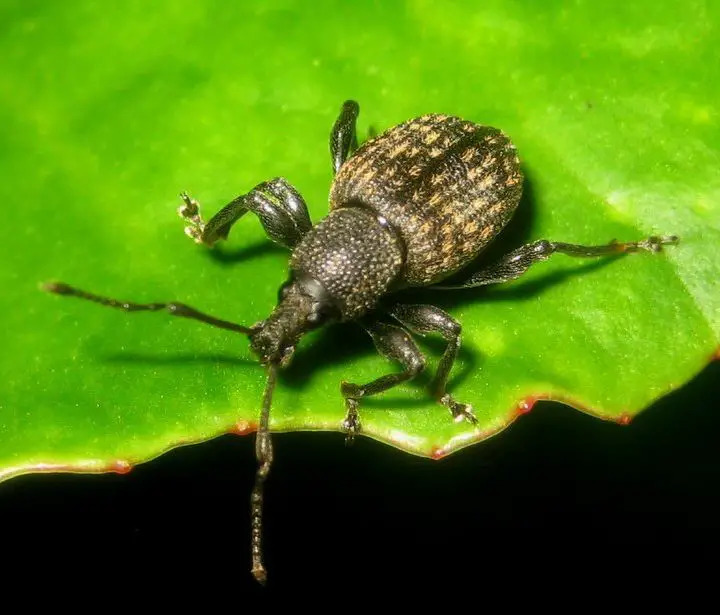
Image source: Wikimedia
This bug will consume your hostas, violets, and ferns, to name a few of its favorite dishes.
Black Vine Weevils are not the most common pest in gardens, but they can be found if you do not take precautions to protect your garden from these small critters who can cause major damage to certain plants in a short period of time.
The black vine weevil is attracted to light-colored veins on the leaves of their favored plant life. Once they have consumed enough material from that area, they will burrow into other parts of the plant life where they lay eggs for their young.
Black Vine Weevils are extremely destructive and can cause damage to certain plant matter that is beyond repair if proper measures are not taken to protect them.
They will consume almost anything pine, rose, lilac, rhododendron, hosta, violet's, etc., as well as the leaves of these plants too, which is just downright frightening in my opinion.
They come out mostly at dusk/dawn but have been known to attack later in the day depending on how hungry they feel or time of year too, which makes it hard to predict when they may strike next. So if you notice holes in your plant life and excrement, chances are it might be a black vine weevil to blame.
Black Vine Weevils are a species of beetle that are attracted to plants with light-colored veins in the leaves or plant life they like to consume and lay their eggs on. If you have these little insects in your garden, it would be best to do some research and learn how to get rid of them permanently before you find holes all over your prized hosta plant life that could lead to its untimely death if not handled properly.
To kill black vine weevils, you can use insecticidal soap spray or soak the affected areas in soapy water (Neem oil is another alternative) to kill the larvae inside the hosta plant life.
You can also make a natural homemade insecticide by washing soda using 1 cup of it and adding 5 cups of water; spray this onto your plants using a pump or hose attachment which will help get rid of these pests before they can infect another part of your garden.
What animals eat hosta leaves?
Deers, rabbits, cutworms, caterpillars, slugs, and snails love eating hosta leaves.
The adult black vine weevil eats hosta leaves, stems, and fruits.
Rodents such as squirrels, voles, rats, gophers, moles not only eating hosta leaves but peels the bark, woody stems from the hostas and dig under and gnaw up the roots.
Skunks, raccoons, and possums can eat hosta leaves, but they usually prefer other foods.
Do skunks eat hostas?
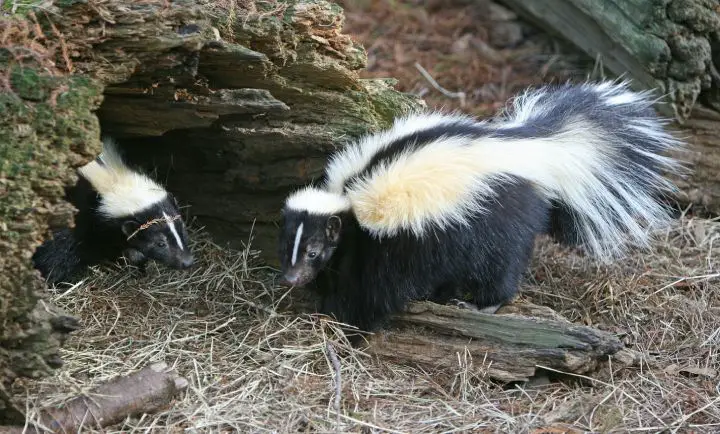
Skunks tend to use an omnivorous diet composed largely of insects, rodents, and plants. Skunks are "opportunistic omnivores," which means that they will eat pretty much anything if given a chance.
Skunks can eat hostas. However, they don't have a taste for it.
Their general diet consists of insects, rodents, berries, nuts, and other vegetables. Hosta's aren't on the menu for Skunks.
Skunks are generally not interested in hostas as a food source.
Although skunks can easily eat hostas, it is very rare for a skunk to eat them. Unless they are hungry enough and their main food sources are not available.
Do raccoons eat hostas?

Raccoons can eat hostas, but like skunks, they do not consume them very often.
Raccoons will eat just about anything that they can get their hands on. Raccoons are omnivores meaning that they will eat both meat and plants.
Their diet consists of insects, berries, nuts, fish, other small animals such as snakes and turtles and is very versatile, consisting of any food source that is easily accessible to them.
Raccoons do not consume hostas very often because your average raccoon would more likely choose various easier-to-forage foods over hostas.
However, if a raccoon or skunk is desperate enough due to food scarcity, it might partake in a plant like a hosta.
Do possums eat hostas?

Possums are also considered to be omnivores, meaning that they will eat both meat and plants. Possums will typically consume insects, fruits, berries, seeds, and small animals.
Possums tend to favor a diet of plant-based foods though.
The largest percentage of their diet is made up of native plants such as grasses, herbs, shrubs (such as saltbush), eucalyptus leaves, and acacia gum. They even eat the sugar maple tree's sap while it runs!
Although possums can eat hostas if they choose to do so or are desperate enough for food. It is not a usual occurrence for them to partake in these types of vegetation.
Unless you live in an area that is heavily populated with possums, such as a forest or swampy area, your hostas are probably safe from them.
So no, they don't generally eat hostas. Instead, they would much rather feast on berries and other types of vegetation. However, if the opportunity arose and there was nothing else to munch on... Possums would eat hostas just like any other animal!
Do birds eat hostas?
No. The birds in my yard leave them alone.
Birds do not eat hostas, but sometimes they use the leaves as nesting material for their young. If the birds eat your leaves, it's because of caterpillars or leafminers inside the plant matter and not because you have a bird problem. You can spray your plants with neem oil to keep them away from your hosta foliage next time if this happens again.
As I said above, white grubs eat Hosta roots (and other lily-family Root vegetables). But why would a bird attack a plant? Not very likely!
Do bears eat hostas?

No, bears do not eat hostas.
Bears, especially black bears, are attracted to the berries and fruit found in your garden. Bears will, however, remove tender hosta foliage if it's available so that they can reach their food source easier without worrying about being seen by a larger predator.
Do groundhogs or woodchucks eat hostas?
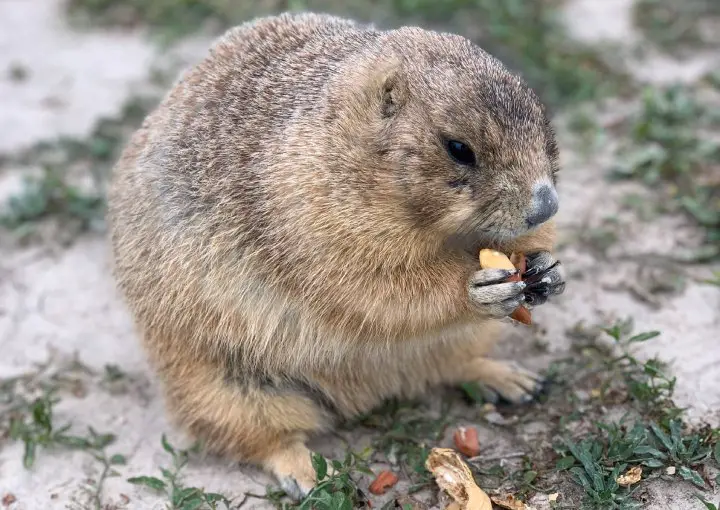
Yes, groundhogs may eat tender baby hostas. But hostas are not their favorite food source. Instead, they prefer clover, alfalfa, bean or pea plants, and other garden vegetables.
Groundhogs will also eat your fruit and veggie crops if they get the chance.
They can also burrow into and chew on your Hosta plants at ground level. If given access to them by a hole dug into an underground barrier, you might have covered or protected your garden from lawn digging animals.
Woodchucks are very similar to groundhogs, except they prefer more forested environments than those near homes. They eat all types of vegetables like carrots, lettuce, corn -- anything really as long as it's available in their environment.
Do caterpillars eat hosta leaves?
Yes, caterpillars can eat hosta leaves, but not usually. Caterpillars will eat mostly green leafy vegetable plants like cabbage and lettuce. They may munch on other types of plants like your Hosta if the opportunity is available to them.
If you notice small holes in or around the leaves and stems of your hostas, it may be time to use a spray to get rid of these pests before they kill off large amounts of plant material.
Do ants eat hostas?
No, ants do not eat hostas.
Ants can help to protect the plant life from other insects, specifically slugs and snails that may be within your garden soil, searching for food.
They work together with their colony members to eat or gnaw on their bodies until they die. Once this happens, the ants will carry said slug or snail back home and eat it as a source of protein and carbohydrates -- Yummy!
The next time you see small holes in your plants, take a look around before deciding what type of insect is eating at your Hosta foliage. It could really prevent unnecessary damage and maintain its natural beauty without any worry about killing off the important natural balance within your environment.
How to prevent animals eat your hostas?
1. Build a fence or net around your yard to protect your hostas. In other words, keep all of the animals out!
2. Handpicking the pests from the leaves when they are small.
3. You may also use special repellents. It's important to choose the right one, or it may even be harmful to your plants.
4. If you do not want to spend money on repellent, some homemade solutions, such as chili, onion juice, or garlic sprays.
5. Neem oil can help you protect them from pests.
CONCLUSION
The pure happiness the hostas bring to a green thumb’s heart is incomparable. Just gazing at the beauty of your work brings wonders to your mind. For me, they are my therapy to keep me calm.
Surely, you will understand to know that having such creatures who can destroy it is utterly devastating. That is why I make sure to let you know what animals eat hostas. Being aware of such situations can prevent the destruction of your hostas.
Prevention is vital. Especially regarding protecting the garden that you have toiled and spent a fortune. The animals around helps balance nature. Hence, it is also our responsibility to protect them. Be responsible and don’t use drastic measures that may harm them while protecting your hostas.

